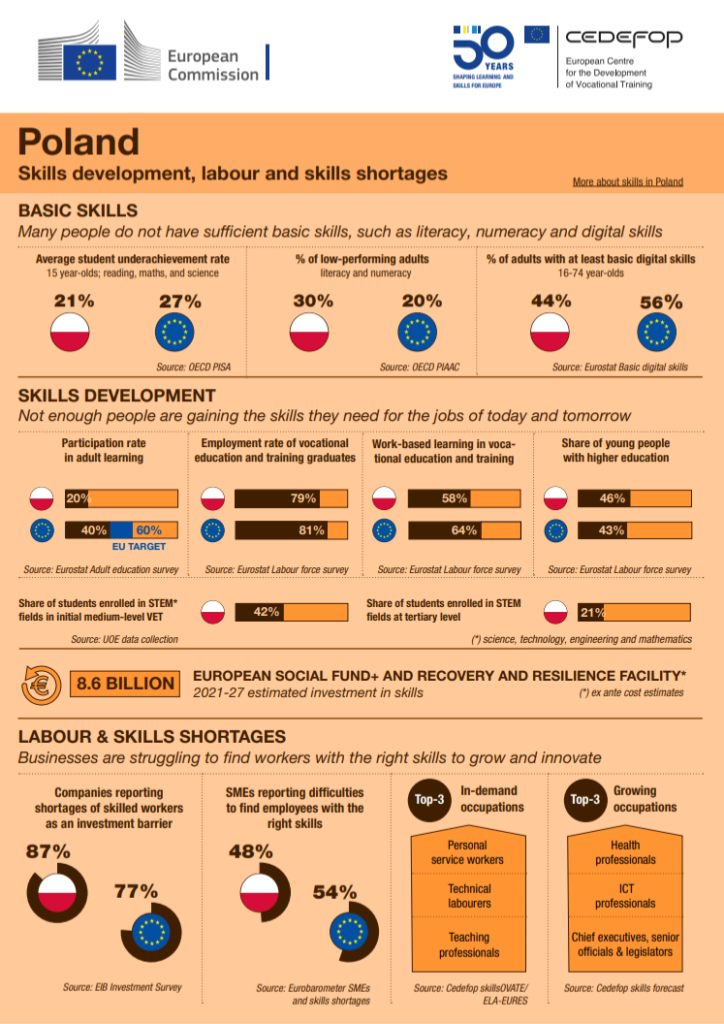The European Union has announced a new program – Union of Skills. Its goal is to support Europeans in developing key skills and adapting to the evolving job market. With the growing demand for new competencies and increasing challenges for employers, the EU is investing in education, training, and talent mobility. What is the current situation in Poland, and what changes could this program bring?
What Challenges Does Poland Face?
The European labor market is undergoing dynamic changes, driven by technological advancements and the green transition. As a result, more industries require specialists with new skill sets. Like other EU countries, Poland faces challenges in education and aligning workforce competencies with economic needs.
Key Statistics:
- 30% of 15-year-olds in Poland have low proficiency in reading, mathematics, and science (EU average: 20%).
- 44% of Polish adults (aged 16-74) have only basic digital skills, compared to 56% in the EU.
- Only 21% of students choose STEM fields, despite their crucial role in driving innovation and economic growth.
- 64% of small and medium-sized enterprises (SMEs) in Poland struggle to find employees with the right qualifications.
These figures highlight the importance of access to high-quality education and upskilling opportunities for Poland’s and Europe’s competitiveness.

Source: www.cedefop.europa.eu
Union of Skills – The EU’s Answer to Skills Gaps
Union of Skills is a program designed to support education, training, and workforce mobility across Europe. Its key objectives include:
- Better education – Investments in literacy, numeracy, and digital skills for children, young people, and adults (Basic Skills Support Scheme).
- More training and reskilling opportunities – Helping workers gain new qualifications and adapt to labor market changes (Skills Guarantee pilot).
- Easier recognition of qualifications across the EU – Facilitating workforce mobility and making it easier for professionals to find jobs in different countries (Skills Portability Initiative).
- Attracting top talent – Simplifying recruitment and visa processes for highly skilled professionals from outside the EU to support key economic sectors (EU Talent Pool, Visa Strategy).
New EU Goals for 2030
The European Union is not only investing in education but also setting specific targets for 2030 to improve the quality of learning and increase the number of specialists in key fields. The main objectives include:
- reducing the percentage of students struggling with reading, mathematics, science, and digital skills to below 15%,
- increasing the number of top-performing students in these fields to at least 15%,
- raising the share of vocational education students choosing STEM fields to at least 45%, with at least 25% being women,
- increasing the proportion of students in higher education enrolled in STEM fields to at least 32%, with 40% being women,
- boosting the number of PhD candidates specializing in information and communication technologies (ICT) to at least 5%, with 1 in 3 being women.
Through these measures, the EU aims to build a more competitive economy and provide Europeans with better career development opportunities.
Over €150 Billion for Skills Development
To achieve these goals, the European Union is investing over €150 billion in education and vocational training between 2021 and 2027. These funds will be allocated to training programs, educational initiatives, and support systems that help people develop their skills. Through Union of Skills, people of all ages – from students to experienced professionals – will gain better access to training and opportunities to enhance their qualifications. This initiative also presents an opportunity for businesses, which will benefit from a more skilled workforce.
Source: Union of Skills

